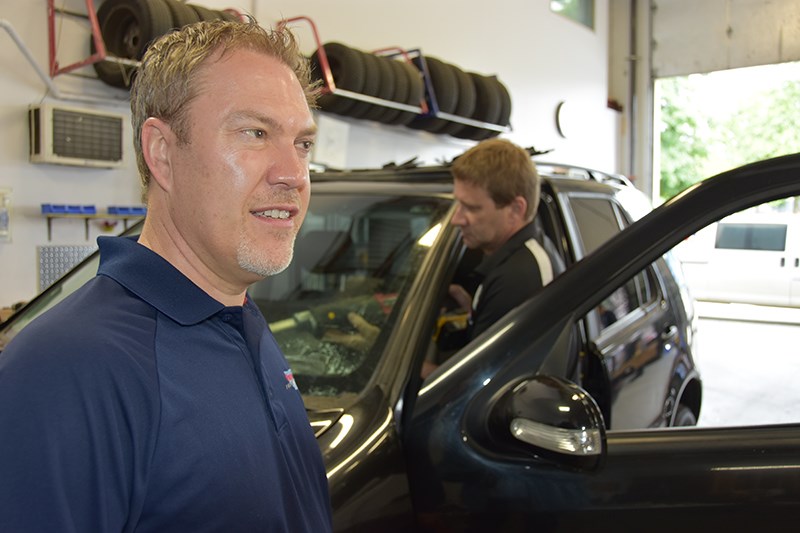When Lawrence Grant opened up an email from the Insurance Corporation of B.C. on May 1 he realized the viability of his Rapid Auto Glass outlet in Coquitlam was about to take a huge hit.
According to the Automotive Retailers Association (ARA), the crown corporation informed the industry it was increasing the discount it takes as a volume customer for replacement windshields from 11% to 25%.
"I was very disappointed. They didn't consult with the industry at all," said Grant, whose Tupper Avenue shop is across Blue Mountain Road from an ICBC claims centre. "What they're asking us we're not able to do and stay in business."
The ARA, which represents B.C.'s after-market automotive repair business, went on the attack Wednesday holding a press conference to call on the government and ICBC to postpone the policy, which took effect on Monday (June 4), and consult with the industry.
"It's obviously extremely concerning for our industry, which is already one that is struggling in a competitive marketplace," said ARA president Ken McCormack flanked by about 25 auto glass repair business owners from as far away as Prince George and Vancouver Island in front of Grant's garage.
McCormack maintained the 14% increase in the discounts is a contravention of an agreement with ICBC that any variance over 4% would be subject to negotiation.
The new policy also requires shops to take the cheapest available windshield, something McCormack said could have a severe impact on the industry's ability to serve customers. There are two basic sources of auto glass. One is car dealers and the other is the aftermarket. McCormack said if the dealership price is lower installation could be delayed by days forcing the customer to either park the vehicle at the shop, drive with an unsafe windshield or pay to rent a replacement.
McCormack estimated the policy changes will mean a loss of $70,000 to $110,000 in annual revenue to most shops.
"We have not seen a rate increase from ICBC in 20 years," said McCormack. "We have an industry now whose labour rate is one-third less than the rest of the province. Obviously, that is not sustainable.
"We're already hearing shops have laid off employees. One of the first casualties is going to be the apprentices."
Grant said Rapid has been at its location for more than 20 years and employs 12 people. He estimated the policy change could mean a loss of up to $200,000 (about $800 a day) in annual revenue because "we're a high-volume shop."
"We have a large, loyal customer base," said Grant.
Grant said ICBC makes up 90% of his company's business. ICBC paid Rapid nearly $1.25 million for the 15-month period ending March 31, 2017.
ICBC is also cutting automatic payments for moulding replacement, even if it wasn't needed. It's a practice the ARA said ICBC implemented to help shops offset administration costs. McCormack took exception to the government's and ICBC's "innuendo" of overbilling.
"The industry did not ask for that. It is not a practice we support," said McCormack, who assailed the government and ICBC for not discussing the changes ahead of time. "That's not something we would call a partnership. There was no consultation whatsoever. They were unilaterally imposed by ICBC. We were shocked to hear the government approved.
"We only ask that we be part of the conversation and the solution."
McCormack said the glass repair industry is not responsible for ICBC forecasting a reported $1.3 billion loss for its last fiscal year.
The corporation said the changes will help reduce costs and put the policies in line with best practices.
"These changes to glass pricing are long overdue and mean ICBC will no longer be overpaying for glass replacements," wrote spokeswoman Lindsay Olsen in an email to the Tri-City News. "They also mean ICBC will rightfully now only pay a glass moulding allowance when suppliers replace the moulding."
ICBC said payments have jumped by 140% in the last decade going from approximately $40 million in 2008 to $96 million in 2017 because there's been increases in the number of claims and the average cost of those claims.
The changes will mean a savings of about $9 million, according to ICBC.
"The assertions that ICBC is asking shops to use a cheaper or inferior product and that this will cause delays to customers' repairs is completely baseless. The process for ordering replacement windshields and arranging appointments based on those orders should not be impacted by the changes."
ICBC also rebutted the industry's assertion its labour rates for glass suppliers hasn't been raised in 20 years saying it had an increase for its top tier glass suppliers (Glass Express) on Jan. 1, 2016.



